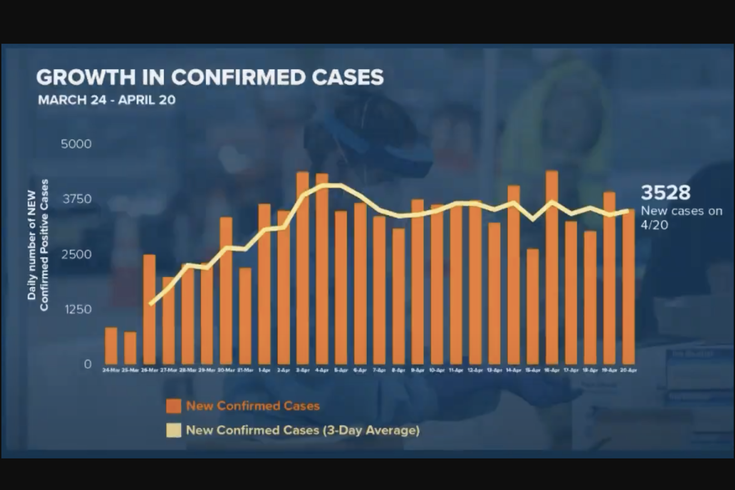
April 20, 2020
 New Jersey Office of the Governor/YouTube
New Jersey Office of the Governor/YouTube
The number of coronavirus cases is stabilizing across across New Jersey, Gov. Murphy says.
New Jersey is seeing "relative stability" in the daily number of new coronavirus cases, Gov. Phil Murphy said.
"This doesn't mean that we aren't going to see some days with one-off spikes or drops, and we must move away from looking at snapshot data and instead overall trend lines," Murphy said on Monday.
Despite the positive news, Murphy warned that the number of people with COVID-19 will continue to rise. New Jersey already has the second-most COVID-19 deaths in the United States.
On Monday, state officials reported 3,528 additional cases of COVID-19, bringing the state's total to 88,806 who have tested positive for the coronavirus. There have now been 4,377 deaths due to the virus across New Jersey.
This chart shows our three-week trend in reporting new cases. We’ve achieved relative stability.
— Governor Phil Murphy (@GovMurphy) April 20, 2020
This doesn’t mean we aren’t going to see some days with one-off spikes and drops. We must move away from looking at snapshot data and instead look at overall trendlines. pic.twitter.com/brqfu72TRP
The state is also seeing similar stability in the number of coronavirus hospital patients who are in critical or intensive care, the governor said. Of the 6,986 hospitalizations from COVID-19 in New Jersey, 2,018 are currently in critical or intensive care.
IMPORTANT: We are seeing relative stability in the number of patients in critical or intensive care. pic.twitter.com/XKZdFaI2Al
— Governor Phil Murphy (@GovMurphy) April 20, 2020
Additionally, the number of hospital discharges is outpacing hospital intakes. There were only 482 new COVID-19 hospitalizations during the previous 24 hours, compared to 583 people who were sent home.
The decrease in hospitalizations and the higher rate of discharges are the most important data in deciding when the state can begin to reopen the economy, Murphy said. Theses statistics indicate that "the health care system is in a better position to get ahead and stay ahead," and that social distancing measures are working, he said.
"We are not by any means claiming victory, but we are making progress," Murphy said. "We have much further to go."
The number of newly hospitalized patients is moving on a DOWNWARD TREND.
— Governor Phil Murphy (@GovMurphy) April 20, 2020
This is one of our most-important positive indicators. It means that our health care system is in a better position to get ahead and stay ahead. It means that our social distancing efforts are working. pic.twitter.com/nhV2PahX0J
IMPORTANT: The number of discharges continues to outpace the numbers from intake.
— Governor Phil Murphy (@GovMurphy) April 20, 2020
We are not claiming victory, but we are making progress. pic.twitter.com/v4gRELPhTg
The rate of time it takes for new coronavirus cases to double is greater than one week for every New Jersey county, further evidence that the curve is flattening. This includes Cumberland and Salem counties where as recently as last week the number of COVID-19 cases were doubling every week or less, which at the time was faster than any other county.
Burlington, Cape May and Gloucester are among the New Jersey counties where the doubling rate is greater than two weeks, which Murphy called "really encouraging."
LOOK: The rates by which the numbers of new #COVID19 cases are doubling have significantly SLOWED.
— Governor Phil Murphy (@GovMurphy) April 20, 2020
Just a few weeks ago, in some areas of the state cases were doubling in a matter of days. Now we’re seeing those rates slow to where we can measure them in the numbers of weeks. pic.twitter.com/onEl4gkgzo
This week, the governor will announce the benchmarks that the state must reach in order for New Jersey to begin reopening businesses, but he cautioned against residents getting hopes too high.
"Do not think for one minute that we're going to be able to flip a switch and return to life as we knew it," Murphy said. "We will be careful and we will be strategic. We will continue to ask for you to play your part. We will make decisions based on facts and medical science, so that we do not experience or exacerbate a second boomerang wave."
Even if every step of reopening the state is followed correctly and residents continue to practice social distancing, the boomerang effect of the coronavirus is still a real possibility, Murphy said. He also reiterated the need for a regional approach when deciding how to reopen the economy, as New Jersey is part of a seven-state council working on a plan to reopen the economy.
"We will align ourselves with our region to ensure that as one of us begins to reopen, we don't inadvertently expose each other to more cases of COVID-19," Murphy said. "We are working in a coalition because New Jersey is not alone in this. We are drawing from our neighbors' insights and experiences to make sure that New Jersey comes out of this."
Murphy and other New Jersey officials will tour the Atlantic City Convention Center field hospital, which has created about 250 beds for South Jersey residents with non-COVID-19 issues. It's one of three temporary facilities in the state intended expand hospital bed capacity.
State officials don't expect the Atlantic City hospital to be as busy as similar facilities set up in the Meadowlands Exposition Center in Secaucus and the New Jersey Convention and Exposition Center in Edison. But the South Jersey site could become vital as testing ramps up across the region and asymptomatic people with coronavirus are identified and need a place to isolate away from home.
Follow Pat & PhillyVoice on Twitter: @Pat_Ralph | @thePhillyVoice
Like us on Facebook: PhillyVoice
Add Pat's RSS feed to your feed reader
Have a news tip? Let us know.